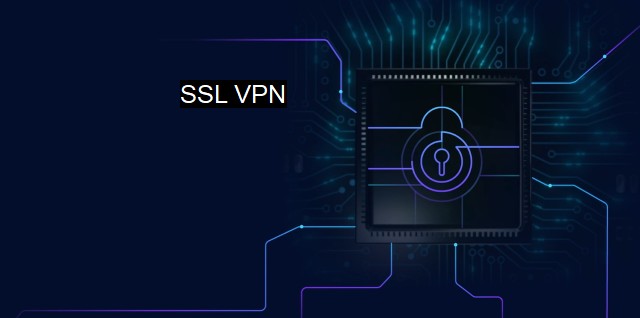What is SSL VPN?
The Vital Role of SSL VPN Encryption in Cybersecurity and Personal Security: Protecting Confidentiality, Integrity, and Availability of Sensitive Information.
An SSL VPN (Secure Sockets Layer virtual private network) is an advanced technology that allows remote users to connect securely to a private network, using a public telecommunications infrastructure like the internet. With SSL VPNs, remote users can access the network from anywhere — from home, a hotel, or even from a mobile device.SSL VPNs serve a pivotal role in contemporary network security and are a major element within the broader cybersecurity arena. The concept of an SSL VPN is firmly grounded in two major components: SSL (Secure Sockets Layer) and VPN (Virtual Private Network).
SSL is security technology that’s designed to enable encrypted communication between a web browser and a web server. It secure's a user's privacy and data integrity by helping prevent hackers, ISPs, surveillance agencies or any other interested parties from intercepting and interpreting the transmitted data.
On the other hand, a VPN conveys private network traffic over the public network, allowing users to send and receive data as if their computing devices were part of the private network. This enhances the attributes of confidentiality and anonymity. The combination of these two technologies results in an SSL VPN, making online activities private, secure, and impregnable.
How does SSL VPN work? it uses a protocol called SSL to secure the data transmission. When a user connects to an SSL VPN, the VPN device creates an SSL tunnel to authenticate and encrypt the data before allowing it to pass through. The essential function of this cryptographic protocol is to provide privacy, authentication, and data integrity between two communicating computer applications, protecting from data breaches and cyberthreats.
SSL VPN comes in two types: SSL Portal VPN and SSL Tunnel VPN. SSL Portal VPN allows one SSL connection to a site, providing access to multiple network services. The user accesses it through a web browser and is presented with a single web page that provides access to other applications.
SSL Tunnel VPN, on the other hand, allows users to access multiple network services from networks or devices that don't support typical web browsers or aren't able to install the needed VPN clients. It "tunnels" network traffic, ensuring complete visibility and control of users' actions.
In the context of antivirus protection, SSL VPNs play a significant role. They add a layer of security that makes it more challenging for cybercriminals to access transmitted data. This technique on its own may not be adequate to ward off all forms of cyber threats, yet, when incorporated with a good antivirus software, SSL VPNs can certainly augment your security capabilities.
Antivirus software scans for, intercepts, and removes viruses and other malicious software, whereas SSL VPN provide confidentiality and integrity to the data across networks. Marrying these two mechanisms together can result in formidable cyber defenses.
SSL VPN is a reliable tool for cybersecurity, providing secure, remote access to a company's network. Streamlining SSL VPN with robust antivirus software can yield enhanced security, defending against the variety of advanced dangers that populate today's cyber landscape. Despite the utmost efforts of both these technologies, it's essential to stay mindful, vigilant, and up-to-date considering the ceaseless, progressing threats in the cyber world.

SSL VPN FAQs
What is SSL VPN and how it works?
SSL VPN (Secure Socket Layer Virtual Private Network) is a technology that provides secure remote access to corporate networks and resources over the internet. It works by creating a secure and encrypted connection between the user's device and the corporate network using SSL encryption. Users can access applications, files, and folders remotely without compromising security.How is SSL VPN different from traditional VPN?
The main difference between SSL VPN and traditional VPN is the protocol they use to establish a secure connection. SSL VPN uses SSL encryption that is built into most web browsers, while traditional VPN uses IPSec or PPTP protocols. SSL VPN is easier to set up and use, requires no additional software, and is more compatible with various devices and operating systems.Is SSL VPN secure?
Yes, SSL VPN is considered a secure method of remote access as it uses SSL encryption to protect data transmissions. SSL encryption provides a high level of security by encrypting data in transit and ensuring its confidentiality, authenticity, and integrity. SSL VPN also provides access control, authentication, and authorization mechanisms to ensure that only authorized users can access corporate resources.Can SSL VPN replace antivirus software?
No, SSL VPN cannot replace antivirus software as they serve different purposes. SSL VPN provides secure remote access to corporate networks and resources while antivirus software protects your device from malware, viruses, and other cyber threats. It is important to have both SSL VPN and antivirus software to ensure comprehensive cybersecurity protection.| | A | | | B | | | C | | | D | | | E | | | F | | | G | | | H | | | I | | | J | | | K | | | L | | | M | |
| | N | | | O | | | P | | | Q | | | R | | | S | | | T | | | U | | | V | | | W | | | X | | | Y | | | Z | |
| | 1 | | | 2 | | | 3 | | | 4 | | | 7 | | | 8 | | |||||||